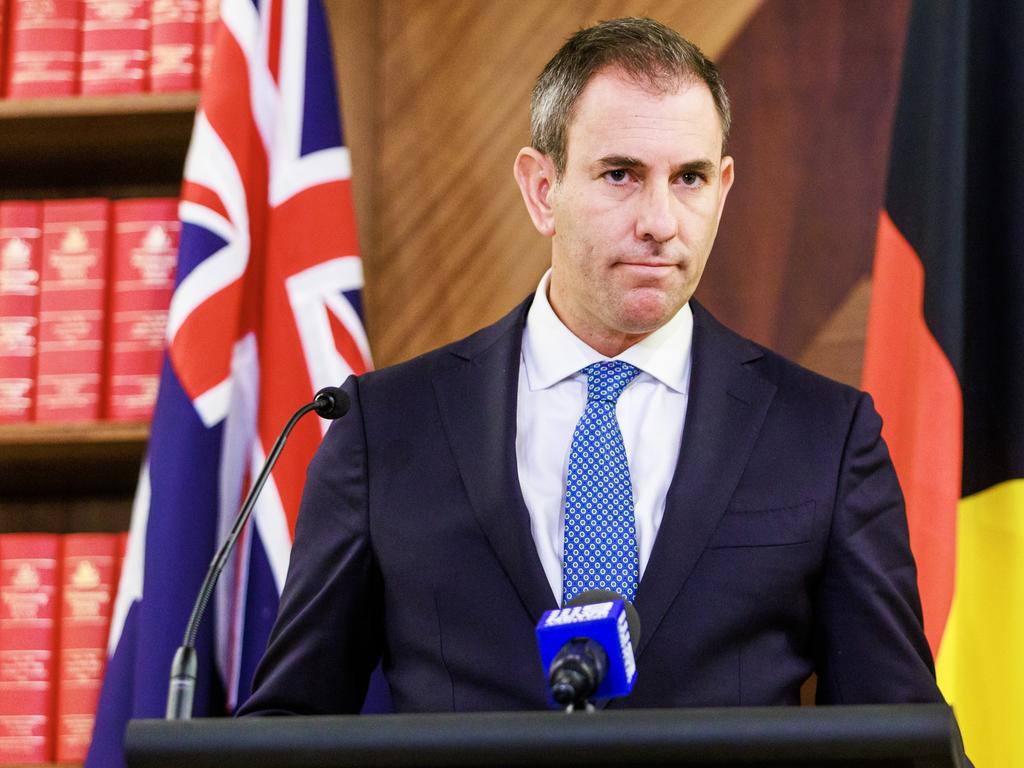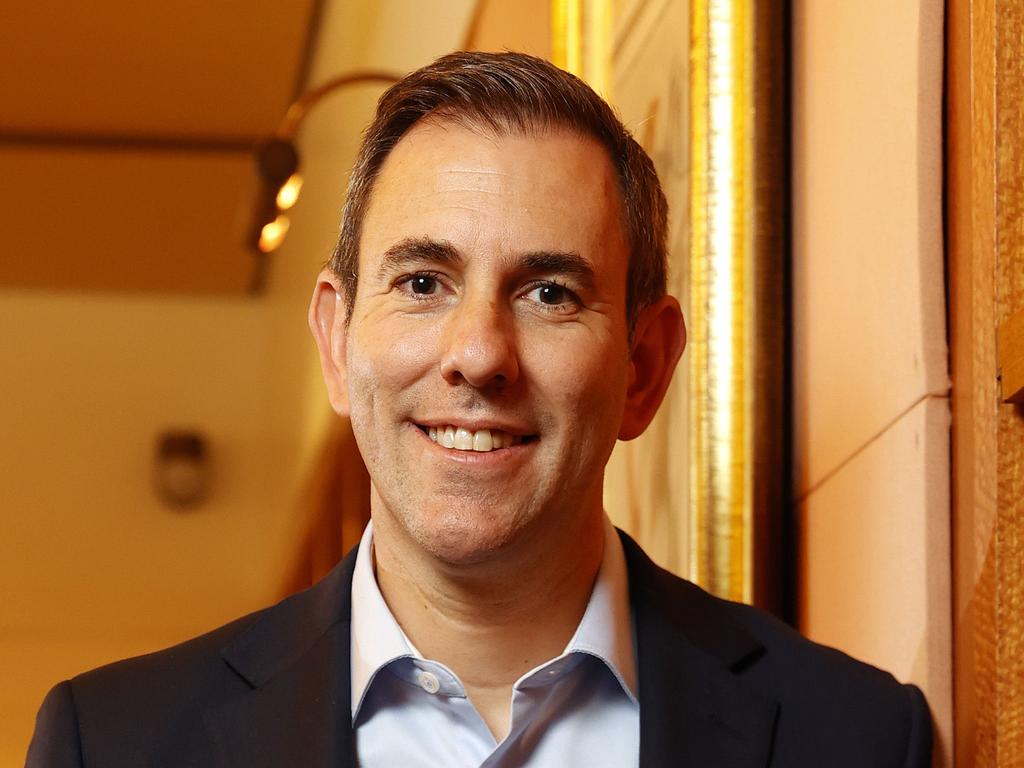Have Chalmers and Albanese learned the lessons of the past?
Having been imprisoned for three years in a campaign straitjacket, Labor seems engaged in a true identity breakout.

Jim Chalmers must be aware of the irony. The test for the Albanese government, however, is whether it has learnt from history – specifically, the failures of the Rudd/Gillard era.
The historical purpose of the Labor Party has been to civilise capitalism. While Labor exists that will never change. It means Labor’s purpose rests on the proposition that capitalism is defective, flawed and needs to be civilised.
Labor governments rise or fall depending on how they respond to this task. Nobody thinks capitalism is perfect but many people might think it superior to Labor’s prescription. The Hawke/Keating era was brilliant because its reforms made capitalism both more efficient and more equitable, quite a result.
The Rudd/Gillard era lived by market failure, greater government intervention and regulation to humanise the enterprise system – but misread the times in which it governed and was repudiated. The lesson: reforming capitalism is tougher than it looks.
The Albanese government has got a stack of challenges: high inflation; rising interest rates; substandard investment; stagnant living standards; high energy prices; and weak productivity. Jim Chalmers’ essay pledging Labor to implement a new form of “values-based capitalism” chalks up another challenge.
Labor figures are addicted to defining their governments through crisis. Off the back of the global financial crisis, Kevin Rudd in his 8000-word essay of February 2009, published in The Monthly, wrote: “From time to time in human history there occur events of truly seismic significance, events that mark a turning point between one epoch and the next, when one orthodoxy is overthrown and another takes its place.”

For Rudd, the era of neoliberalism was being extinguished – what he called a “particular brand of free-market fundamentalism, extreme capitalism and excessive greed”. He said the new epoch of redefined capitalism might be called “social capitalism” or “social democratic capitalism” as the state assumed a greater role in the economy.
Rudd was convinced that he governed at a turning point of global history. Labor’s response to the GFC would be integral to the change of epochs. This is Labor’s egocentricity in action. He used the GFC to put the former Howard government in the dock, depicting the Liberal Party as the “home of neoliberalism in Australia”, the doctrine for the past 30 years responsible for the “economic mayhem which had now been visited upon us”.
The Sydney Morning Herald economics editor Ross Gittins said the idea of Howard as a neoliberal was “laughable”. Economics guru Ross Garnaut said the past 30 years in Australia encompassed the reform age with its “distinct improvement” in economic performance.
The GFC was a crisis originating in a flawed banking system external to Australia – at home there was no bank failure and no market failure.
Rudd’s 30 years of neoliberalism encompassed the Hawke-Keating reforms. How did that figure?
In truth, Rudd denied the real history of Australia for a false history. That’s a big and dangerous step for a prime minister. He never recanted and said later he was “proud” of his essay. In attacking the Liberals, Rudd said only Labor could manage the social contract essential for economic progress.
Above all, Rudd believed his economic thinking was far superior to the Liberals. When Labor, under Rudd and Wayne Swan, prevented a domestic recession from the GFC – their greatest achievement – Rudd was convinced that Labor’s resort to intervention and Keynesian spending was a triumph against the Liberals.
He turned the GFC into a divisive economic contest with the Liberals. They retaliated in force. Labor, eventually, lost the contest.
The Rudd/Gillard government succumbed to its own polemic. After its 2013 defeat, the Labor Party admitted its leadership rivalry failures. But it never admitted the flaws in its economic thinking – those flaws led to excessive government controls and intervention in industrial relations, industry policy, grand spending projects, special interest subsidies, more regulation, flawed tax initiatives and a shunning of market-based reform. Despite its rhetoric, the Rudd/Gillard era discarded the Hawke/Keating model.
Labor had moved on. It became a different party. It ditched the Productivity Commission, market-based micro-economic reform model. That model had next to no champions in the Rudd/Gillard government beyond ritualistic but insincere rhetoric. Labor opposed a more flexible labour market, a tax system that broadened the base and cut the rates, spending reform to deliver a surplus, reform of the federation – and it opted for grand public initiatives, from the Gonski model to the NDIS to the NBN.

The ALP rank and file increasingly went progressive. The party walked away from Keating-style reformism after losing office at the 1996 election. Indeed, it spent nearly five years trying to win office denouncing the Howard-Costello GST-led tax reform, widely seen as the best tax reform of the past generation. Labor still can’t stomach any further GST expansion.
Chalmers’ essay is about Labor’s search for a new economic model. His problem is that it is too vague and imprecise to satisfy the progressive school of government interventionists, while being scary enough to alarm pro-market economic rationalists.
It also seems part of a bigger story; across the board, senior ministers are “coming out”, shedding their campaign caution, ripping off their Clark Kent suits to reveal – what exactly? Their true selves? Having been imprisoned for three years in a campaign straitjacket, Labor seems engaged in a true identity breakout.
Chalmers senses, correctly, that Labor’s “safe change” mantra from its 2022 election victory isn’t enough. Labor always needs a reform ethos, a grand narrative to sustain itself and its supporters.
Chalmers’ effort to provide a philosophical framework is a time-honoured Labor practice. It just hasn’t happened for a few years – and it’s always risky, as Rudd discovered.
What does down-to-earth Anthony Albanese, author of the “safe change” strategy, really think? Albanese needs to be asked how he sees his government implementing “values-based capitalism” for Australia. What vision will other ministers provide when asked the same question?
In truth, it is many years since Labor implemented and propounded a viable economic governing model for Australia. At this point, Winston Churchill’s warning about history demands attention: “We must learn from our mistakes, so that we do not run the risk of repeating them.”
Will Chalmers avoid the fate of Rudd/Gillard? Can he navigate towards a contemporary brand of government intervention that actually delivers and recruits the finance sector to channel the reallocation of capital he seeks towards social and environmental goals? He needs to do better than the Rudd/Gillard government, for whom he worked in the economic engine room for Wayne Swan as treasurer.

Chalmers is posing a big question for Labor. His essay is about how Labor governs in the new world of the 2020s when globalisation is in retreat, market scepticism is rising, protectionism is making a comeback, government intervention is on the march after the Covid-19 pandemic, and new geostrategic alarms cut across the axioms around economic interdependence.
The essay reveals the essential dilemma facing the Albanese government. Chalmers is a Treasurer riding two horses: progressive fidelity, and economic responsibility. He cannot govern in the Hawke-Keating mould because Labor has left that model behind. He cannot replicate the Rudd/Gillard experience because that was unsuccessful. He needs the efficiency of the market system, but Labor’s “civilising” quest drives him to adapt and reform that system.
Every Treasurer must come to grips with the circumstances of his times – that’s what Chalmers is groping towards. He knew there were risks in exposing his thinking still in the formation phase. He wants to have a discussion. He talks about the analysis offered by economic historian Adam Tooze and economist Nouriel Roubini. But when treasurers have a discussion, every word has meaning – and Chalmers threw a stack of value ideas into the air.
No surprise there was confusion and recrimination. Chalmers had to clarify – yes, he believed in markets, he just wanted them to work better. Some critics called him a socialist. High-profile supporter Graeme Samuel praised him, saying the values Chalmers invoked are now being phased in by institutional investors, business strategies and progressive corporate leaders who champion climate change.
The zeitgeist is with Chalmers. His essay will be popular because it captures an evolving mood – that economics must deliver a better life. Business is now obsessed about its social profile and talks up its wider obligations – sometimes this is genuine, but often it is nauseating hypocrisy waiting to be exposed. But will the essay help Labor governance? In truth, Chalmers is searching for a synthesis – a new reform model – for how Labor should govern.
And he struggles with the synthesis. Chalmers has spent six months reassuring markets, corporates and investors that he believes in fiscal consolidation, economic growth and reviving productivity – but he now writes an essay assuring the progressive side of politics that the 2022 election was a “new beginning”, that the old market system can’t do the job, that the remnants of neoliberalism must be purged, and that he seeks a reformed capitalism based on public/private collaboration to better redesign the market economy.
At least he stopped short of branding Scott Morrison and Josh Frydenberg as neoliberals – that would have been beyond laughable.

Chalmers would have been better off providing an expanding set of principles that would guide him as Treasurer. An essay both vague yet ambitious invites others to put their own interpretation on Chalmers and what he stands for.
He writes in the context of two extremely dubious Albanese government interventions: multi-employer bargaining, and putting caps on gas prices. The Treasurer can hardly complain if critics say these are the sort of anti-market interventions he is talking about.
There are two central problems with his essay. The sort of public/private investment partnership he talks about – with the Clean Energy Finance Corporation – as a model can only be a marginal factor in overall economic policy. His essay doesn’t deal with the central economic issues: the budget, tax, spending, growth and productivity.
Second, it overlooks that Australia’s post-1983 reform era success has been based on the market system – on deregulation, pro-market reforms, enterprise-based initiatives, tax reform, budget responsibility and competition policy. Our sluggish recent efforts are precisely because these reforms have not been reinvigorated. They have lost momentum. Those progressives who want a new model and indulge the fantasy that Australia has been a neoliberal wasteland don’t know their history and pose a danger to our prosperity.
Labor must decide whether it wants to change the model – a major mistake – or invest it with new purpose through social and environmental modifications.
In the end, what matters is policy, not the essay. The second Chalmers budget will reveal more about this government’s character than his writing. This is not to say the essay doesn’t matter. It does. It is about ideas, and ideas matter.
It is about a Labor reform model, and that’s critical. But that model will be created through policy decisions.






For the second time in 14 years a Labor government has come to bury neoliberalism.